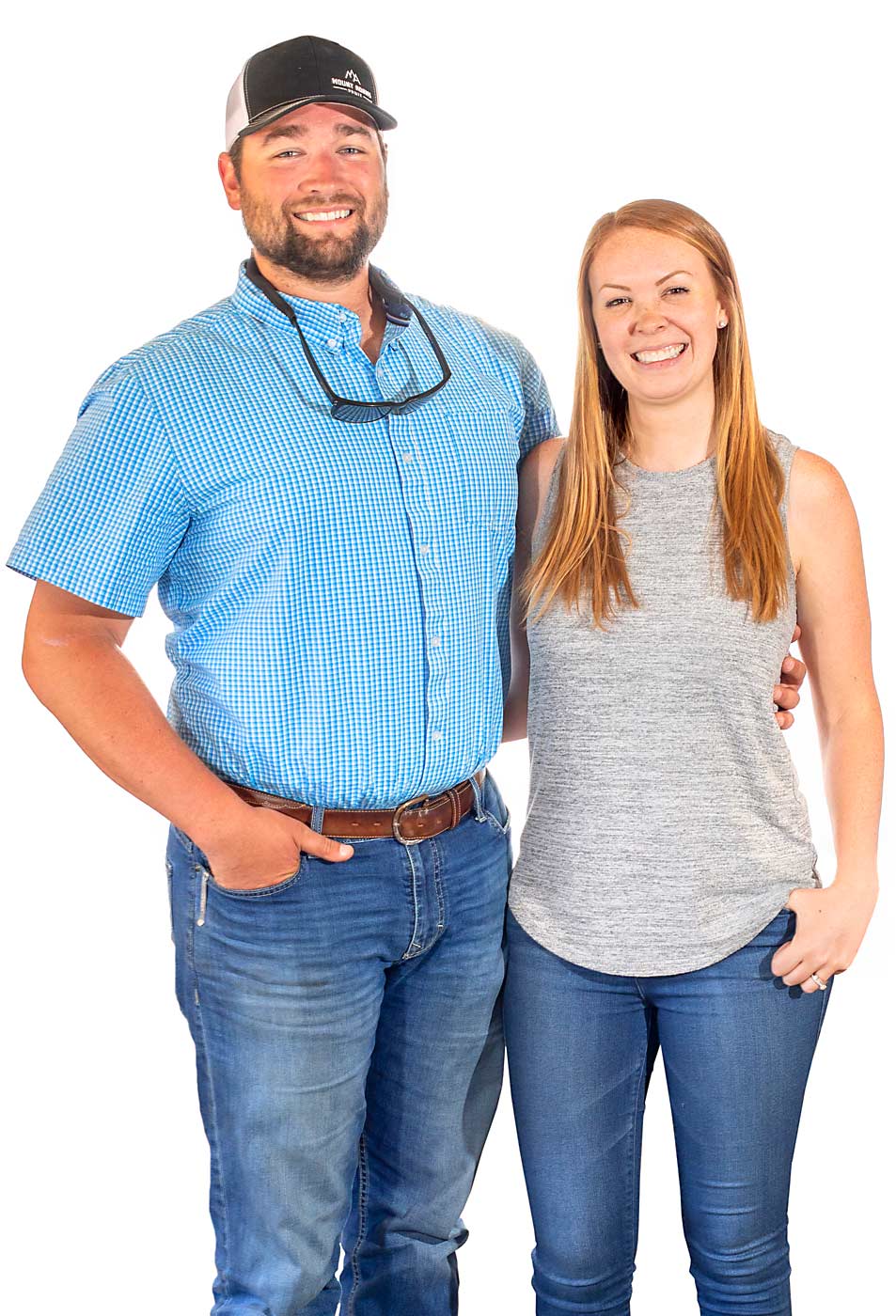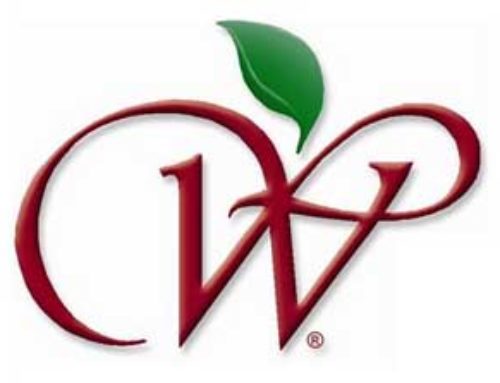family background / Sarah and Parker are first-generation farmers who recently purchased their own farm. Sarah graduated from University of Oregon and earned her master’s degree in business from George Fox University. Parker graduated from Oregon State University with a degree in agricultural business management. Sarah’s parents are Cathy and Paul Rudinsky, and Parker’s parents are Chris and Todd Sherrell.
age/Parker 27, Sarah 31
grower/Hood River, Oregon
crops/Pears, apples and cherries
business/Columbia River Land Management

How did you get your start?
Sarah: I did not originally grow up in agriculture. I spent my summers working on a cherry farm in Hood River during middle school and high school. Then I wandered around in the industry, going down to California to work for a winery, then I spent some time in Yakima working for a sales desk before moving to Hood River.
Parker: I grew up in the Hood River Valley and most of my close friends had family farms. My summer experiences were working in their orchards. My friends and I would work together thinning pears, swamping cherries and eventually working in the packing house. I graduated from Oregon State University, then went up to Yakima, Washington, to learn about orchard management. After about a year I returned to Hood River, and an opportunity popped up for us to start farming on our own land.
How did you find your path as first-time farmers?
Sarah: What we always talked about when we were first together was owning our own orchard. We’ve always loved this industry and wanted to be a part of it, but I didn’t have a lot of experience with ag. I didn’t have an ag family.
Before we went into this fully, I really wanted to understand the whole industry. I knew I wanted to get experience on a sales desk. I felt like it was really important for a farm to understand how a sales team works and be part of that. So, I looked up every sales desk I could find in Yakima and I sent my resume to them, knocking on their doors, asking for any type of job I could find.
When I found an opportunity, I was able to learn how the business works on the packing side with cherries, pears and apples. Once there, I didn’t wait for opportunities, I kept looking for ways to learn and meet people to get to where we are now.
Parker: For me, I wanted to be the primary operator of the farm. It was my end-goal from a young age. What I needed was experience running a farm. I put my sights on learning from big farms in Central Washington, and similar to Sarah, I put my resume out there.
I found there are incredible opportunities out there for young people in the industry. When in college, I imagined that I’d struggle to find work. It turned out I had the ability to choose where I wanted to work after graduation.
I was able to work as a fieldman, boots on the ground, getting to work with several farmers and learn several farm practices. I connected the dots between what I learned in college horticulture to what I was learning in the field.
What excites you about being a farm owner?
Sarah: It’s really stressful but also very exciting because we’re planting trees in our own orchard, and in a couple years we’ll be getting fruit. I’ll be able to see it go from bloom through harvest, into the box and out to a customer. I love being part of something where you get to see all the way through the process.
Since buying our farm, there’s a lot of paperwork and a lot of organizational work. One of my big jobs is keeping the boys organized. I feel like I ask too many questions because I’m a very detail-driven person. I do think many people who farm have a plan, but it’s a “plan” — I want a step-by-step breakdown of the plan.
What helps you with your farm plan?
Sarah: When I had my first job working at the cherry packing house, it was a small group, hand sorting everything. I learned a ton there. Now I’m working with Mount Adams Fruit, a large company where everything is optically sorted. I’ve been able to see all of the support technology grow in the cherry and pear industry.
I think technology breeds efficiency, and we’re hoping to bring some of what we’ve learned back to our farm. When we took over this farm, the prior owners still used paper time sheets and we switched that to FieldClock and use badge scanners for just about everything.
Just about everything I do on the packing house side of my career has been to automate as many processes as possible and use technology for estimating and planning. These are things we’re trying to bring to our small farm.
What tips do you have for starting a small farm?
Parker: I looked for resources that we could afford that help us modernize. For instance, we use Google Sheets for our spray tracking and inventory, which is basically a digital logbook. So, when you go into software like ApRecs to put in your spray record, I’ve already got the information written down in Google Sheets.
I don’t need to go through paper notes because it was done on the tractor when I was finished. Now it’s just transferring the data and I’m done. There’s a lot of tools out there for small farms to improve their organization that they can afford.
Sarah: I think one of our biggest goals starting out was to not have stacks of paper everywhere. We want all of it in electronic form. We use something called ShareFile to upload and organize our documents. We can access our information anywhere. If you’re out in the field and you need to look up something, you can. If you have a smartphone, you can get work done. It’s good having that info at your fingertips.
What advice do you have for first-time young growers?
Parker: It’s really easy to step out of school with your degree and feel like you’ve gained all of this knowledge, but I’d recommend that you suspend your ego heading into your career.
I remember telling my first boss: “Let’s just assume I know nothing and then we can build on that.” The people you’ll be working with have been through things and made mistakes that you’ll probably make — and the best way to avoid them is to ask what they would’ve done different. Those lessons might be the most valuable things you’ll receive.
Sarah: Some of my best learning has come from people who’ve been in this industry for some 50 years. Just sitting and having a conversation with them, seeing where it goes. There are so many people in this industry that want to help the next generation and give us knowledge.
Parker: We asked ourselves, where do we want to be in 10 years? We wanted to have our own farm and have our own company. OK then, how do we get there? We started out with limited experience. We made lists of what we needed to learn, where were we going to do it and how we’d get it done.
Sarah: We’d sit down every New Year’s Eve and plan out the next five to 10 years. I know that sounds cliché, but we’d do this and plan backward from 10 years out. So far, we’ve stayed with that plan and in some cases, things have moved faster than what we anticipated. It was important for us to know what we wanted our future to be like and what steps we needed to take to get there.
—TJ Mullinax






With respect !!!